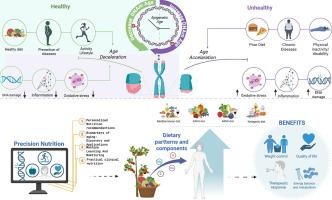Integrating biological age, epigenetic clocks, and telomere length in precision nutrition strategies for chronic disease management: Potential frameworks and ongoing challenges
IF 3.1
3区 医学
Q2 NUTRITION & DIETETICS
引用次数: 0
Abstract
Precision nutrition is emerging as a transformative strategy for optimizing health, particularly in the context of biological aging and chronic disease prevention. This review aims to examine how biological age markers—specifically telomere length and epigenetic clocks—can be integrated into precision nutrition frameworks to personalize interventions, enhance chronic disease management, and support healthy aging. Telomere length is a widely studied biomarker of aging and chronic disease risk, while epigenetic clocks, based on DNA methylation patterns, offer complementary insights into biological age, gene expression, and disease susceptibility. Nutritional interventions rich in antioxidants, omega-3 fatty acids, polyphenols, B vitamins, and anti-inflammatory compounds have shown potential to modulate these biomarkers, supporting cellular health and delaying aging processes. In addition, lifestyle factors such as physical activity, stress management, and adequate sleep play critical roles in maintaining telomere integrity and epigenetic stability. However, challenges remain in translating these biomarkers into clinical practice. Importantly, variability is not the only barrier; most of these biomarkers still lack clinical validation, and there is no consensus on standardized protocols or reference values that would support their routine application in healthcare. Current guidelines recommend combining telomere length and epigenetic age with other molecular markers, such as multi-omics data, within integrative biological age assessment approaches. Nevertheless, translating this approach into clinical practice will require overcoming significant limitations, including the validation of biomarkers, standardization of measurement techniques, cost-effectiveness, and the development of clear clinical guidelines. Continued research is essential to confirm their predictive value and practical utility in precision nutrition strategies aimed at promoting healthy aging and preventing chronic diseases.

将生物年龄、表观遗传时钟和端粒长度整合到慢性疾病管理的精确营养策略中:潜在的框架和持续的挑战
精准营养正在成为优化健康的一种变革性战略,特别是在生物衰老和慢性疾病预防的背景下。本综述旨在探讨如何将生物年龄标记-特别是端粒长度和表观遗传时钟-整合到精确营养框架中,以实现个性化干预,加强慢性病管理,并支持健康老龄化。端粒长度是一个被广泛研究的衰老和慢性疾病风险的生物标志物,而表观遗传时钟,基于DNA甲基化模式,提供了对生物年龄,基因表达和疾病易感性的补充见解。富含抗氧化剂、omega-3脂肪酸、多酚、B族维生素和抗炎化合物的营养干预已显示出调节这些生物标志物、支持细胞健康和延缓衰老过程的潜力。此外,生活方式因素,如体育活动、压力管理和充足的睡眠,在维持端粒完整性和表观遗传稳定性方面发挥着关键作用。然而,将这些生物标志物转化为临床实践仍然存在挑战。重要的是,可变性不是唯一的障碍;这些生物标志物中的大多数仍然缺乏临床验证,并且在标准化方案或参考值方面没有达成共识,以支持其在医疗保健中的常规应用。目前的指南建议将端粒长度和表观遗传年龄与其他分子标记相结合,如多组学数据,在综合生物学年龄评估方法中。然而,将这种方法转化为临床实践将需要克服重大限制,包括生物标志物的验证、测量技术的标准化、成本效益和制定明确的临床指南。为了确认它们在促进健康老龄化和预防慢性疾病的精确营养策略中的预测价值和实际应用,继续研究是必不可少的。
本文章由计算机程序翻译,如有差异,请以英文原文为准。
求助全文
约1分钟内获得全文
求助全文
来源期刊

Nutrition Research
医学-营养学
CiteScore
7.60
自引率
2.20%
发文量
107
审稿时长
58 days
期刊介绍:
Nutrition Research publishes original research articles, communications, and reviews on basic and applied nutrition. The mission of Nutrition Research is to serve as the journal for global communication of nutrition and life sciences research on diet and health. The field of nutrition sciences includes, but is not limited to, the study of nutrients during growth, reproduction, aging, health, and disease.
Articles covering basic and applied research on all aspects of nutrition sciences are encouraged, including: nutritional biochemistry and metabolism; metabolomics, nutrient gene interactions; nutrient requirements for health; nutrition and disease; digestion and absorption; nutritional anthropology; epidemiology; the influence of socioeconomic and cultural factors on nutrition of the individual and the community; the impact of nutrient intake on disease response and behavior; the consequences of nutritional deficiency on growth and development, endocrine and nervous systems, and immunity; nutrition and gut microbiota; food intolerance and allergy; nutrient drug interactions; nutrition and aging; nutrition and cancer; obesity; diabetes; and intervention programs.
 求助内容:
求助内容: 应助结果提醒方式:
应助结果提醒方式:


